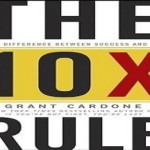How To Fail at Almost Everything and Still Win Big – Book I Read
Written By Scott Adams the creator of Dilbert
The primary theme of the book is not to have goal’s but to have systems. If you keep working at your system you will eventually have success. If you only have a goals and you reach the goal you will let down until you form new goals to achieve.
Important Points I Learned
- Every new skill you learn you double your chances for success.
- Smiling make you feel better, even if your smile is a fake. It makes others around you feel better.
- The market doesn’t reward good ideas, it rewards execution.
- Timing is often the biggest component of success.
- (Timing is also a success factor as noted in a TED talk by Bill Gross) Scott says to try many things until you get the timing right by LUCK.
- Create something that is easy to reproduce. Don’t trade your time for dollars.
- If you want success, figure out the price and pay it.
List of Skills Everyone Should Learn
- Public Speaking
- Praise is better than criticism.
- Business Writing
- Get to the point.
- Leave out all of the noise.
- Golf
- Psychology
- It is helpful to be aware of psycological issues that affect people decision making. He provided a brief list but more can be found on Wikipedia under Cognitive Bias, the following are a brief listing.
- Ambiguity Effect – The tendency to avoid options for which missing information makes the probability seem “unknown”.
- Anchoring or Focalism – The tendency to rely too heavily, or “anchor”, on one trait or piece of information when making decisions (usually the first piece of information that we acquire on that subject)
- Bandwagon Effect – The tendency to do (or believe) things because many other people do (or believe) the same. Related to groupthink and herd behavior.[18]
- Base Rate Fallacy or Base Rate Neglect – The tendency to ignore base rate information (generic, general information) and focus on specific information (information only pertaining to a certain case).
- Bias Blind Spot – The tendency to see oneself as less biased than other people, or to be able to identify more cognitive biases in others than in oneself.
- Framing effect – Drawing different conclusions from the same information, depending on how that information is presented.
- Frequency illusion The illusion in which a word, a name, or other thing that has recently come to one’s attention suddenly seems to appear with improbable frequency shortly afterwards (not to be confused with the recency illusion or selection bias). Colloquially, this illusion is known as the Baader-Meinhof Phenomenon.
- Information bias The tendency to seek information even when it cannot affect action.
- Loss aversion The disutility of giving up an object is greater than the utility associated with acquiring it. (see also Sunk cost effects and endowment effect).
- Stereotyping Expecting a member of a group to have certain characteristics without having actual information about that individual.
- Survivorship bias Concentrating on the people or things that “survived” some process and inadvertently overlooking those that didn’t because of their lack of visibility.
- Time-saving bias Underestimations of the time that could be saved (or lost) when increasing (or decreasing) from a relatively low speed and overestimation of the time that could be saved (or lost) when increasing (or decreasing) from a relatively high speed.
- It is helpful to be aware of psycological issues that affect people decision making. He provided a brief list but more can be found on Wikipedia under Cognitive Bias, the following are a brief listing.
- Accounting
- Design
- Learn some design basics.
- Conversation
- Introduce yourself and ask questions until you find a point of mutual interest.
- What is your name?
- Where do you live?
- Do you have a family?
- What do you do for a living?
- Do you have any hobbies or play any sports?
- Do you have any upcoming travel plans or went on a recent trip?
- Skip joking mode.
- The other person wants to talk about something interesting and to sound knowledgeable.
- Your job is to make that easy.
- Nothing is easier than talking about ones self.
- Good conversation techniques:
- Ask questions.
- Don’t complain…much.
- Don’t talk about boring experiences: TV shows, meals, dreams.
- Don’t dominate the conversation.
- Don’t get stuck on one topic.
- Planning is not conversation.
- Keep sad stories short.
- Introduce yourself and ask questions until you find a point of mutual interest.
- Overcoming Shyness
- Learning a 2nd Language
- Proper Grammar
- Persuasion
- Most people don’t use reason to make a decision. “When politicians tell lies they know the press wil call them out.” They know is does not matter, they understand reason will never have much of a role in a voting decision.
- A lie that makes a voter feel good is better than 100 rational arguments.
- When I heard Scott say this all I could think was, did Donald Trump read this book and use this strategy verbatim?
- Persuasive phrases:
- Is there any thing you can do for me?
- Would you mind…
- I’m not interested…
- I have a rule…
- I don’t do that…
- I just want to clarify…
- Most people don’t use reason to make a decision. “When politicians tell lies they know the press wil call them out.” They know is does not matter, they understand reason will never have much of a role in a voting decision.
- Technology
- Proper Voice Technique
- Writing a Thank You Note –
- Share A Secret – Start small, not everyone can keep a secret. Builds bonds.
- Decisiveness looks like leadership.
- Energy shows enthusiasm.
- Crazy is viewed as leadership.
- Lack of fear of embarrassment.
- Education – constantly learning.
- Exercise – Scott spent a lot of time disussing excersise and the benefits.
Stephen Covey – 7 Habits of Highly Effective People
Scott discussed Stephen’s book.
Good Diet & Exercise
Scott spent a lot of time on having a good diet. He listed a bunch of foods that worked for him. Basically make it easy for yourself to eat well. Have convenient healthy foods around your house. Eat as much as you want of healthy.
Happiness
Happiness = The ability to do what you want, when you want.
Happiness has more to do with where you are heading than where you are.
 Previous Post
Previous Post Next Post
Next Post